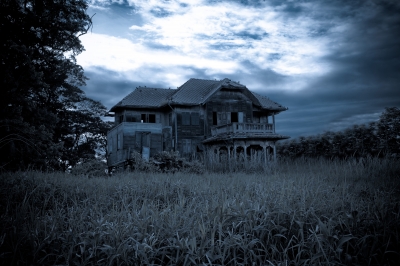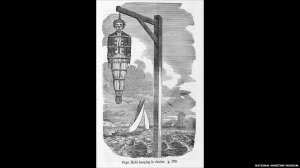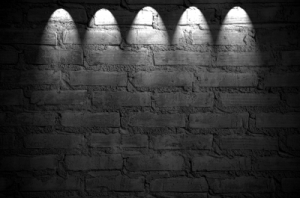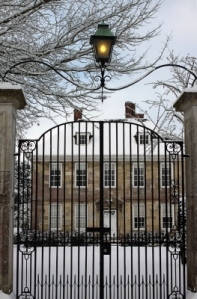I started writing this in January after having a strange dream which was partly a memory from a recent holiday, and partly a weird mixture of things I’ve been researching lately. I’ve tried to coalesce these ideas here in a kind of magic realist monster story. Hope you enjoy!
Image: Ponttovuori tunnel by Tiia Monto: Wikipedia Commons.
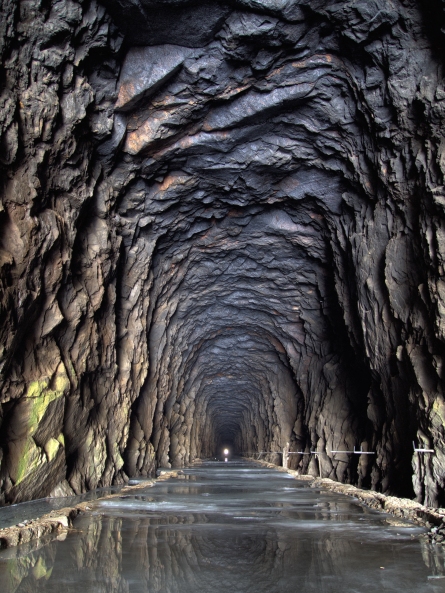
OLYMPUS DIGITAL CAMERA
Victor stood on the dark river bank and watched the small motions of the water. It would have been generous to call them waves, he thought. It made him sad just looking at the lapping futility of those tiny ripples touching his shoes. Something about being cooped up in that place, hour after hour in the dim light with the smell of stagnant water all around him made him feel scooped out; hollowed like a shucked oyster. Faces of co-workers blurred in and out of his field of vision, blobs on the periphery, flitting in between trees. They ceased to be individual people, and became like darting shadows, or memories. The sounds of the boats creaking into their moorings, of chatter, and of the last passengers disembarking onto the bank had now died away to almost nothing. Victor had finished his final sweep of area and was simply waiting to be sent home. A headache was clustering behind his eyes. It had started as he began extinguishing the torches. Now he could see their flames every time he blinked, and he could smell the paraffin on his clothes.
Over on the other bank, Tim was flirting with someone. Victor knew who it was without having to look up. She gave muted responses Victor could barely hear. He should have asked her out years ago, but there was never a good time. The music was cut off abruptly. The main spotlights extinguished with a finality, a resounding click which echoed around the cavern. A kind of strained calm descended like a heavy curtain falling. Feelings on top of feelings layered up at the back of Victor’s mind like a scrap heap. He tossed them into some hidden part of himself as if they held nothing of value. He worried that they were worse than useless, that they were slowly but surely poisoning him; rotting carcases poisoning a stream. It was the end of a long day, and he had worked too hard. He had been staring too long into the water.
On the other side of what passed for a sand bar coated in a chattering of palm trees, he saw Rose looking at him. She was pulling an empty boat back in to shore, securing it with a thick rope to the jetty. Her black hair glinted liquorice in the almost moonlight. Her arms with their fine hairs were strong. She had a sweet face. Victor wanted to love her more than anything else in the whole world, but he never had the energy. Words just fell out his mouth like accidents. It wasn’t that he was too nervous, or didn’t have the courage. He was incapable. Someone had cut all the wires inside so he no longer worked properly.
“Hey bud,” he felt a hand slap his shoulder.
“You alright?” Joseph’s hand was wet. Victor felt it soak through the back of his polo shirt.
“Fine, fine.”
Joseph shifted a little. “Almost done for the night, but there’s a boat got stuck back in Tunnel One.”
“You want me to go get it?”
Joseph’s face fell down into a sloppy sort of smile, like someone had pulled away a beam somewhere.
“Oh, would you? That would be great, my shoulder’s getting a little, you know,” he made a show of rolling the shoulder round in the joint, rubbing it with a long pale hand. Joseph probably had a date tonight.
“Sure, go on home.”
Tunnel One was a quite a walk away. You could follow the route the designated path led you along, winding up and through several cold, stone corridors lined by torches. With these now extinguished, and only the guide lights to walk by, it was easy to miss the right turning. Besides, it would be quicker to stay on the bank and just stumble across the scenery. You weren’t supposed to, strictly, but everyone did it. Rose called to Victor as he hopped his way along the sand towards the first of the tunnels, but Victor only waved at her. Her downturned eyes had a haunted look as she watched him pass out of reach. She might wait for him to be finished with this last task so that they could walk to the carpark together, she might, or she might not. Maybe this time she would just give up.
When you really love someone, truly, you will do everything you can to keep from hurting them. It’s as simple as a reflex. Victor had observed it. Had felt it for himself. You could want to hurt them in an instant, but the minute you see what that hurt might mean, you pull back. You can’t really do it. Victor knew that, and so it was easier to be with girls who didn’t think twice about hurting him. That way, he didn’t owe them anything. He appreciated rather than enjoyed the machinations of the girls who wanted the things they could achieve through him. It made him feel needed in a way he could easily dispose of. Victor just couldn’t take Rose pining for him gently all the way over there on the bank like that for no good reason at all except that she loved him. It felt like that kind of investment in him, as a man, was something beyond him. It was more than he had been brought up to expect.
Tunnel Four was short enough. It had a thin lip on either side that allowed you to slink along with your back to the wall. Victor had gotten pretty good at moving that way, he was light on his feet. The truth was that he liked to explore the cavern sometimes. He liked being alone in the dark, it was only sometimes that he felt that ache in his stomach and the feeling that he was choking. It was the people, mostly, not the river, or the darkness, or the artificial palms. People had expectations, and he liked it when he could fulfil them. When he couldn’t, he choked.
Victor passed out into his favourite part of the ride. It was the main scene, where the huge model pirate ship loomed out at you from the third tunnel with the sound of cracking cannons and the sulphurous smoke billowing automatically from her sides. The ship was silent now, all her lights extinguished, but the smoke still lingered to give the air a sickly sweet smell. The waters here were rippling still, though no boats troubled them. The tourists were long gone. It gave Victor pause. He stood at the entrance to Tunnel Three and watched the little waves reverberating outwards. His walkie talkie buzzed at his hip. It was Maurice in the command tower.
“Anyone in there still?” the voice crackled.
Victor pulled the walkie talkie up, and pressed the button with a quick flick of his thumb.
“Can’t see anybody here, Chief. Ride closed half an hour ago.”
He could almost feel Maurice sighing. It made him nervous.
“Ah, forget it. You getting the boat?”
“Yeah, how come you asked?”
“What?” The signal was a little jumpy.
“About there being someone here.”
“Oh,” there was hesitation which might just have been a time lag.
“Oh, well, it’s just our numbers for the last boat were off by one, that’s all.”
“…when you did the transfer?”
“Yeah, switched folks from Boat Two to Boat three. Boat Two got stuck in the tunnel again, but it was the last of the day so we just left it there.”
“Better than being on train tracks eh Chief?”
“Yeah,” Maurice chuckled. He had worked for all the major themeparks at one time or another. Too many animatronics, he used to say. Too much to go wrong. Here they had real sand with real boats, even if the palms were plastic.
“Maybe someone miscounted when they loaded the boat up. It’s late,” Victor’s voice had a shrug in it.
“Yeah, yeah maybe” Maurice seemed to be receding into the static. “But you know, Tunnel One…”
There was a pause.
“Yeah. It’s that Déjà vu feeling again,”
Victor didn’t really know what to say. He aimed for flippant but missed.
Maurice’s voice said something which sounded like “Bermuda Triangle,” but the words became distorted and the walkie talkie cut off.
Victor became acutely aware of where he was. It was as if the immediate silence caused by the cut off signal had pounced on him from all around. The waters rippled and the great ship sat, fat bellied, empty of life, staring at him.
Victor continued on through Tunnel Three and out into Pirate Town. Only the guide lights shone so the parapets and mannequins cast uneven shadows onto the set. Bluebeard’s beady black eyes glimmered under the small spotlights beaming up feebly from the ground. These lights were hidden in plastic shrubbery, covered in coloured gels, so that they bathed the figures in an eerie crimson glow. The pirates’ skin had a waxy look up close. Some had scuff marks, peeling patches you couldn’t see from the boats. Their hair was stiff with dust. Only some had the capability of movement. All looked as if they might have some deeply disturbing level of sentience when you turned your back on them, as if there was something staring out beneath the waxen surface that resented imprisonment. Victor stopped and rubbed his face with his hands. His skin felt creepy. There was a breeze coming from somewhere. He was tired. He pushed on past the inhabitants of Pirate Town and into Tunnel Two.
The Cove had a different kind of light. It shimmered in lilacs and aquamarines and the underwater lighting gave the river a lagoon-like quality. Victor enjoyed being in The Cove like this, without the larger spotlights on it seemed even more magical. It didn’t matter to him that he couldn’t clearly see the rag-tag skeletons or the fake treasure chests with their plastic rubies and tin foil doubloons. Two mermaids’ tails hung down over the peak of a rock, and their scales glittered. Engorged, naked breasts sat on their chests like crème puffs with cherry-red nipples, but the top half of the bodies were cast in heavy shadow. There was only the suggestion of something round and inviting, nothing parents could complain about, if they saw it. And if they saw it – as Maurice always used to say – then they really had to be looking. Victor gazed longingly up at them. They were grotesque and silent. Their bodies had no heads. Victor wondered whether Rose had waited for him after all. Shame crawled over him like insects. He usually enjoyed being in this part of the ride most of all, but today it seemed somehow alien to him, like he was seeing it for the first time.
Tunnel One lay ahead, just a wide gaping mouth. There was no light from within, and no sound except a rhythmic slapping. The boat must be trapped inside, its rudder caught on something on the river bed, its prow jammed in an outcropping of rock. It wasn’t the first time. Tunnel One was a bugbear for the guides, and it was the first tunnel they came to. The traffic jams were a major headache for Maurice, who said he was waiting on the go-ahead from the Operations Manager to close the ride for a few days to get that section patched. It was just everyday stuff. But Tunnel One had this reputation. Sometimes people were miscounted when they were placed in boats. Sometimes you could have sworn there were people who went in and didn’t come out. Lone travellers, always. Never families, never couples, never children. Rose swore blind she knew a man who had vanished in Tunnel One. That was six months ago, and she was still jumpy. Then there was Gloria, who had worked with them for a little while. Tall, always in pigtails, Gloria had a loud laugh and liked to pinch the other guides in the dark just for a joke. One day she forgot to clock out at the end of her shift, and never came back. Last time Rose had seen her she was heading into Tunnel One.
Victor pushed his thoughts away like he was pushing hairs out of his eyes. They did him no good, he told himself. The breeze was starting to annoy him. He thought he could hear rain tapping on the roof of the cavern above and felt a momentary chill sweep through him. This was no time to get the ghoulies. He got to moving. He passed through the entrance to the tunnel and the sound of rain vanished. The tapping of the boat against the cave lip was constant, and gentle, but on the other side to where he was poised. Victor made a calculated hop, which should have been enough to carry him across, but it wasn’t. It was if the air had pushed him, mid step. He had slammed into something which couldn’t have been there. Victor landed on his back in the river with a splash, his mouth filled with the rancid taste of stagnant, chlorinated water. He gasped and pushed towards the boat, treading water until he could find his feet. The waterline came up to his neck. It was dark; Tunnel One had no lights. It was supposed to freak out the passengers while spooky pirate music blared out of the speakers before dropping them into The Cove with a splash. The way the tunnel rose up slightly towards the entrance and curved around meant that only a meagre amount of light from the scene ahead spilled in. Victor fumbled for the side of the boat and tried to shake it loose, but something had it well and truly jammed. He struggled with it, having to hold his breath for bouts while he dipped beneath the water. That was when he felt something touch him. Reaching under his shirt to place a cold hand on the small of his back. He spun round, spluttering water but it was too dark too see anything.
“Hey!” he shouted, not liking the way his voice echoed throughout the tunnel. It sounded afraid.
Nothing answered.
Victor swam around the boat and tried to climb up onto the stone lip, but his feet couldn’t settle on a foothold. The stone edge was too slippery for his hands. It was like the water wouldn’t let him go. Panic started in his stomach and spread upwards. He tried to stay calm, and breath deeply. He placed both his hands on the ledge and tried to think of the coolness of the stone and the water seeping into him and making him numb, emotionless. Somewhere far off he thought he heard Rose’s voice calling for him, but he couldn’t seem to call back. The little mind-trick was working, though, he was starting to feel a numbness creeping through his limbs, like slender hands stroking his skin. They reached up and around him, over his waist and chest, down his legs and up towards his collar bone. Whispers rose in the Tunnel, like twin voices. He felt a tugging.
“If I don’t feel anything I won’t lose it,” he said, mechanically.
The hands began to drag him slowly away from the edge, into the water. He saw shapes above him. He was being tugged from the waist downwards. The ground that had been beneath his feet moments ago now just seemed to fall away. In the last of the light, Victor saw their roundness; their glittering bodies. It made him go limp. He knew them like he knew himself, he thought, and so he let them take hold of him. Their faces were not at all how he imagined them to be. Their skin was puffy and loose. They had cherry-red lips, but their eyes were pale and insipid, almost devoid of colour. He looked into their faces, longing to see the joy, and familiarity he felt, but their expressions were utterly passionless. Workmanlike, they pushed him down beneath them, wrapping his body in their long muscular tails. His hands flailed for them, but they were inconstant. They moved too fast for him to hold anything but air. Their greed for him was rabid, hungry and desperate. He would give them what they wanted for as long as they needed him. It was easier than resisting. It was good to be needed, to give until the point of exsanguination. To feel your own ego, obliterated by another. The waves licked his body in undulations as they pulled him down. Whispers slipped between his ears but breaking through the murmurs he heard Rose calling to him for the last time. There was a sharpness in his heart, and in his stomach. The hands which had been stroking him were claws. The two thoughts converged. He ripped open his lungs to scream but the water swallowed him up with a snap, leaving only ripples.
Rose had waited for Victor, but he never came. When his walkie talkie couldn’t be raised she and Maurice had converged upon The Cove without bothering to consult one another. Tunnel One was a empty; a silent column of darkness. The blue water shimmered as the rogue boat, now turned loose, drifted aimlessly. Rose began to shout out for Victor again, flashing her torch beam in wide arcs, its light penetrating beyond the tunnel mouth to reveal only walls and water. A feeling was creeping its way down her neck like an icicle. Maurice looked over her shoulder. He was making laboured breaths but no movements. He seemed to be trying to come to a decision. Together, they stood like that for a moment, staring into the tunnel, each thinking their own dark thoughts, and the boat slipped gently away behind them, carried off by the lapping waves.
It was then that Rose caught a faint suggestion in the air of a scent. Aftershave. The sound of rain on the cavern roof. A memory of an experience that wasn’t hers. Her name being called. She handed Maurice the torch, and jumped into the water. There was the remnant of a whisper in her ear and a vision of floating, bloated faces. She whirled around as an instinct pulled her gaze upwards towards the rock.
Nothing but a pair of plaster sphinxes. Headless, in the shadows.
Rose plunged into the tunnel, and tasted blood. The water was deeper than it should have been.
Somewhere in the depths, a voice was calling to her.

